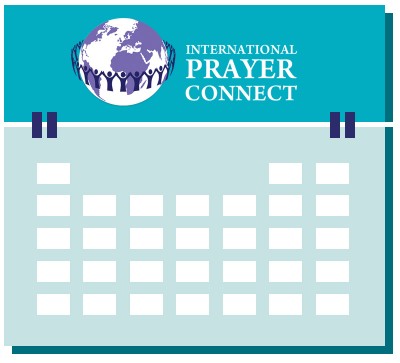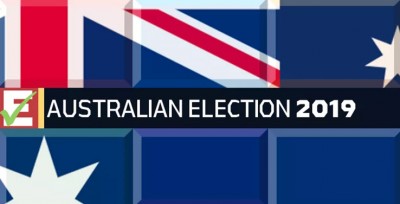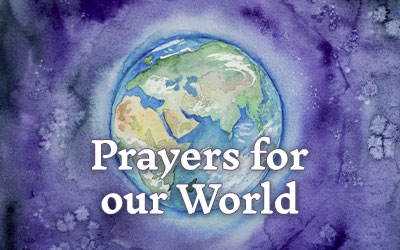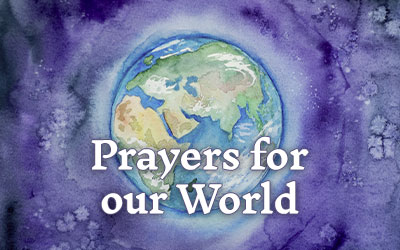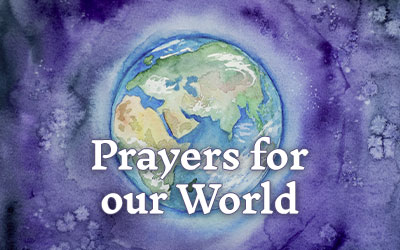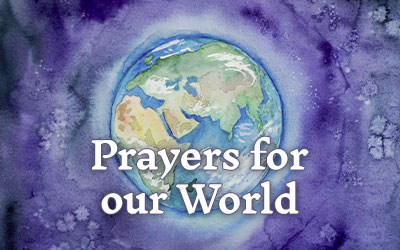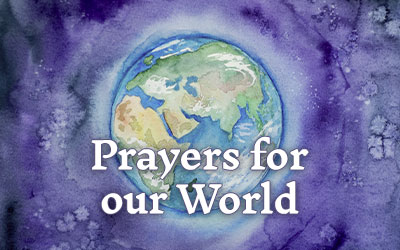Nigeria: Year of Prayer – 1st May 2018 – 30th April 2019
http://www.pray4nigeria.org/
40 Days of Hope, California. March 6 - April 14, 2019
https://40daysofhope.net/
Middle East - Special Prayer Effort - April 11-13
http://freedomtocaptives.com/
Americas National Day of Repentance
http://www.dayofrepentance1.org
Europe Shall be Saved - 40 DOP - 1 Mar – 9 April 2019
https://esbs.org/hc-video/
United Prayer Rising Europe – 8-11 July 2019
www.uprisingeurope.org
One God - One Day - One Africa – 31stMay 2020
www.1gda.org
South East Asia Prayer Council Conference – 8-11 October 2019
https://www.seaprayer2019singapore.org/
Go 2020 May 2020
https://www.go2020.world
Australia appeals for intercession andwisdom from the nations in its looming hour of crisis and hope.
The great Southland of the Holy Spirit, Australia, is pivoted on a historic threshold of persecution or reformation, or both, at the expected Federal election on the 11th or 18th of May.
At stake are many affronts to our Judeo-Christian heritage including the following:
Legal abortion to full term in all states and territories
Threat to our relationship with Israel including building an embassy in Jerusalem.
Removal of opening Parliament in prayer including the reference to humbly relying on Almighty God
Defunding of Chaplaincy
Removal of Charitable status for churches.
Imposition of gender fluidity doctrine on our children
Assault on freedom of thought, conscience and belief in many contexts including the curriculum in our Christian schools.
Government Christian Politicians are being specifically targeted by well-funded groups like GetUp! To the tune of hundreds of thousands of dollars per candidate. If they succeed there will be a decimation of Christian politicians who stand for our values.
PRAYER THOUGHTS
Please pray as you are led along the following suggestions and always subject to the Sovereignty and wisdom of our Heavenly Father:
That Australia will fulfil its mandate as the great Southland of the Holy Spirit.
That the church will arise as one through revelation of the Trinity’s desire for our oneness in John 17, and not through persecution.
That even if it takes persecution for the His daughters and sons to become one, there will be understanding that even this is the Father’s Mercy.
That wisdom counsel and might will be upon our praying Prime Minister especially as he deals with the aftermath and the traps following the Christchurch tragedy.
That if he is successful at the election, the Senate will enable him to govern to protect and advance the remnants of our Judeo-Christian heritage.
That if he is unsuccessful at the election, that the composition of the Senate will resist the spirits that have deceived politicians who think they are legislating for compassion, understanding and respect,but are being exploited by the cunningof the evil one.
That the demonic schemes to remove Christian politicians backfire and that not only those seats are held but that even more will be won.
That the Esthers,Deborahs, Daniels,Mordechais and Josephs and other modern equivalents are revealed and begin to fully function.
CONCLUSION
James 3:16 says that “where you have envy and selfish ambition, there you find disorder and every evil practice.” KJV
Australia has a Spirit-filled praying Prime minister who has ascended to authority in the opposite spirit of loyalty and faithfulness. Can we pray that Divine order and Godly practice will fill this land as an example and blessing to the nations?
Thank you for standing with us.
Mark Mudri
Co-chair of prayer for advocates international and chief of staff for federal government senator
http://advocatesinternational.org/
A mighty day of prayer was launched on March 7th 2019 in Indonesia. By God’s grace and miracle, 555 cities, 511 cities in Indonesia and 44 cities overseas, participated in this Solemn Assembly to pray for the peace of Indonesia.
Hundreds of thousands gathered together in one accord across these 555 cities! No men, organization or churches could have made this happen where churches from different cities and denominations responded. Glory to His name and may His name only be exalted. Praise be to Jesus as the Prince of Peace who can bring peace to the nation of Indonesia.
Pray for the Peace of Indonesia was initiated by the prayer and church leaders in Indonesia, including the Council of Churches in Indonesia, Indonesian Evangelical Council, Indonesian Pentecostal Council, Catholic Bishop Conference of Indonesia, Salvation Army, Baptist, Orthodox, and the 7th day of Adventist Churches in Indonesia together with the Indonesian National Prayer Network, Transform World Connect Indonesia and My Home Indonesia.
These leaders, churches and organizations agreed to unite together to pray for the Presidential and Legislative election which will be held on the 17th of April, 2019.
On that date, Indonesians are heading to the polls to vote on the Presidential Candidates and also to elect the 711 seats at People Consultative Assembly. This election will decide the future and direction of this nation, politically and economically.
As the election is getting closer, the political situation is heating up. Issues of ethnicity, religion, race and intergroup relations are the dominating factors which are segregating and splitting the nation. Hoax, fake news and hate speech attract voters based on their ethnicity, race and religion.
It has created much tension and chaos in the nation among the radical, the moderate Moslem and the minority. As we all know, Indonesia population is 87 % Moslem. It is crucial that the President and Legislators elect people who uphold truth, justice, tolerance, equality and stand for all races and religions in the fear of God.
This is why we called for a solemn assembly for the churches to humble themselves and pray and seek God’s face and turn from our wicked ways. We trust the Lord will hear our cry from heaven, forgive our sin and heal our land (2 Chr. 7:14).
Please join us in praying for:
The call for unity among the body of Christ to reconcile, to unite, to pray and to stand together for this upcoming election.
The preparation of the Presidential and Legislative Election will be in order and free from intervention in 34 Provinces and 800,000 polls throughout the cities.
Indonesian National Police and National Armed Forces would remain neutral and would uphold justice and peace.
The General Election Commission would do their job honestly and without impartiality.
The voters will be free to vote wisely, cleverly, freely, directly, honestly and fairly with God’s wisdom and without any intimidation.
Pray for thepeace of God to cover the cities and nation.
Pray that God’s chosen persons that will be elected. People who have high integrity, honest, true, just, tolerant and hold the value of morality and equality for all ethnicity, races and religions and persons who serve the people and nation and not just their group, religion or party.
Thank you for your prayer and stood with us. God bless you all.
Charles Jonan
Indonesian National Prayer Committee Chairman
As with most countries, India is no stranger to political drama. The last half-decade, however, have evidenced political activity that warrants extra attention. The author will aim to give a concise snapshot of the core issue so that readers will be better equipped to pray.
In India there is a religious organization known as RSS. It is often characterized by Hindu extremism; and is active at various levels of society. Because RSS cannot be a political party, it created a political party which is known as BJP. RSS therefore controls BJP. The BJP came into power in 2014, and its Prime Minister is Narendra Modi.
In 2014, seven states in India were controlled by BJP. By 2018, their rule had spread to 21 states. During this period of time, religious polarization has been on the rise, as has the persecution of Christians. Misuse of power (in the government) has become evident. Persons in authority who were viewed as threats or obstacles to the BJP have been removed and replaced with those in favor of it. If BJP is re-elected, the right people will be in the right places and the BJP will more easily be able to move its agenda forward.
In May 2019 India is holding its central government elections. This will be a key vote which will determine whether or not the BJP and Mr. Modi will have another five years at the helm. The RSS is well-organized with people, as well as media, and is endeavoring to influence (in part with reportedly corrupt methods) the election results.
Many people are asking the same question: what will happen if the BJP wins in May? Here are a few key things that seem likely:
Top on the RSS/BJP agenda is to impose Hindu Rashthra. This basically means that they will try to make India an all-Hindu nation. An anti-conversion law will likely be passed immediately which would make it illegal for people to proselytize (to share their faith with the goal of converting those of differing faiths). As an all-Hindu nation, restrictions will be placed on Christians. RSS is already meting out persecution; it will only get worse if BJP wins in May.
Some Christians are already leaving India. For new converts, the aim of RSS/BJP will be to reconvert them to Hinduism. This all-Hindu thrust is a way that Satan is using to try to keep the people in darkness. All over India the Hindu people are praying to their gods and performing religious rites as a way to help further this effort.
In addition, BJP will try to close every Christian organization, especially Christian schools and orphanages as they believe that these are how people come to know Christ. One reason that RSS/BJP hates Christian schools so much is because they teach equality.BJP wants to keep the masses underfoot; to make the rich richer, and the poor poorer. Among the poor is where the Christian church has grown the most. BJP wants to eliminate that class of people (this is also where the majority of the Muslims, outcastes, and tribal people are found). It is estimated that 50% of India’s population are in this class. BJP wants that class to stay poor, uneducated, and to be landless.
The good news, however, is that there appears to have surfaced some cracks in the BJP’s seemingly unstoppable advance to gain control over all of India. These cracks have come in the form of the BJP’s defeat in the state elections of Chhattisgarh, Madya Pradesh, and Rajasthan, as well as their defeat in the May 2018 election in Karnataka. Additionally, an increase in cost of living, the introduction of a GST (Goods and Service Tax), and the demonetization which Modi imposed have had a cumulative negative impact on the economy, with the BJP to blame.
This is only a brief snapshot highlighting the core issue and the significant ramifications to Christians in India if a BJP re-election is won. May God stir our hearts away from apathy, and to our knees, asking and believing Him who is able to do what only He can do!
Here are a few key prayer targets as the May vote approaches:
- That there will be division and disintegration within the RSS/BJP, and that God will thwart and prevent their re-election. Daniel 2:21
- That – regardless of the outcome – God will give Christians in India boldness in their faith, and that the Gospel will continue to move forward. Ephesians 6:19-20
- That God will stir the global Church to pray for India: in regards to the May elections, in regards to believers in India, and in regards to the millions in India which have yet to hear about HIM! 2 Peter 3:9
Sources Used:
- www.timesofindia.com. BJP vs Congress in 2014 & 2016.
- The Indian Express. 21 states are now BJP-ruled, home to 70 per cent of Indians.
- Un-named, reliable sources.
WASHINGTON — Two months after declaring all U.S. troops are leaving Syria, President Donald Trump wrote to members of Congress that he now agrees "100%" with keeping a military presence in Syria.
A bipartisan group of Senators and Representatives wrote to Trump on Feb. 22, applauding his decision to keep a small residual force in Syria.
"We support a small American stabilizing force in Syria," the group wrote, adding that a force "which includes a small contingent of American troops and ground forces from our European allies, is essential to ensure stability and prevent the return of ISIS."
In a copy of the letter obtained by NBC News, Trump highlighted a paragraph in the letter about the U.S. goals in Syria, which said, "Like you, we seek to ensure that all of the gains made in Syria are not lost, that ISIS never returns, that Iran is not emboldened, and that we consolidate our gains and ensure the best outcome in Geneva for American interests."
"I agree 100%. ALL is being done," President Trump responded, writing directly on the letter and signing it.
Since before he took office, Trump has promised to end the fight against the Islamic State, criticizing the cost to the U.S. in both blood and treasure. In a video message on Twitter posted Dec. 19, 2018, the president said: "Our boys, our young women, our men, they're all coming back and they're coming back now. We won."
The Syrian Democratic Forces recently completed their mission against ISIS in the small area of land they controlled in the Middle Euphrates River Valley in Syria. U.S. military officials say the battle to re-take the final part of the town of Baghuz still held by ISIS had been slowed by the exodus of thousands of civilians and the terror group's use of some women and children as human shields.
Late last month, White House press secretary Sarah Sanders confirmed that some U.S. troops will stay in Syria after the Syrian Democratic Forces finish clearing out Baghuz.
"A small peace keeping group of about 200 will remain in Syria for period of time," Sanders said in a one-sentence statement. U.S. military officials have since confirmed the residual force could be double that and that some U.S. troops could stay in the northeastern part of the country, and others in southern Syria.
Praise God for this turnaround in President Trump's policy which will help to achieve and maintain peace and stability in Syria and the region.
Pray for the efforts to continue impartial peace talks in Geneva and for an end to be brokered to the seven years of civil war.
Pray for aid and support for the hundreds of thousands of displaced people and the many victims of this war.
Please continue to be in prayer for Afghanistan where amidst a number of challenges and setbacks, there are significant efforts taking place to pursue peace talks between the Government, the Taliban, militant groups and tribal and religious leaders.
U.S. State Department spokesman Robert Palladino told journalists on March 5 that negotiations were continuing on "a daily basis right now and progress is being made."
"The discussions wereongoing and focusing on the four interconnected issues that are going to compose any future agreement," Palladino said, listing them as "terrorism," "troop withdrawal," "intra-Afghan dialogue," and a "cease-fire."
However, this longest round of peace talks between the United States and the Taliban has ended with "real strides" being made but without an agreement on troop withdrawals from Afghanistan, U.S. special envoy Zalmay Khalilzad said on March 12.
“The conditions for peace have improved. It’s clear all sides want to end the war. Despite ups and downs, we kept things on track and made real strides," Khalilzad said on Twitter, adding that another round is possible later this month after the 16 days of negotiations in Qatar's capital, Doha. See: https://www.rferl.org/a/u-s--taliban-peace-talks-end-with-real-strides-made-but-no-deal/29818634.html?ltflags=mailer
This last month has seen two militant led attacks on civilians and Government forces in Jalalabad and Helmand Province with the loss of dozens of lives. See: https://www.rferl.org/a/afghanistan-jalalabad-double-suicide-attack/29806106.html?ltflags=mailer AND https://www.rferl.org/a/taliban-attack-afghan-military-base-helmand-gunbattle/29797634.html?ltflags=mailer
A military source told RFE/RL that a top Afghan commander at the military installation had been killed in the attack.The assault on the base came while the U.S. peace envoy for Afghanistan was in Qatar for the latest round of peace talks.Peace negotiations resumed on March 2 following three days of talks with Taliban negotiators in Doha, aimed at finding a negotiated solution to Afghanistan's 17-year war.
The New York Times reported on March 1 that the proposal currently under discussion could include the withdrawal of U.S. forces in the next three to five years and the creation of a power-sharing government including the Taliban.
In the past, Khalilzad has tried to convince the Taliban to hold direct talks with representatives of Afghanistan's government. The Taliban has rejected that proposal.
In Kabul on February 28, Afghan President Ashraf Ghani reiterated that an Afghan-led peace process would provide lasting stability in the country.
"Afghanistan wants cooperation and collaboration, but Afghans and the legitimate government of Afghanistan should own the peace process," he said.
There are some 14,000 U.S. troops in Afghanistan, as well as thousands of European forces participating in NATO's Resolute Support mission.
Meanwhile, a planned meeting of hundreds of Afghan politicians and tribal, ethnic, and religious leaders aimed at discussing negotiations with the Taliban has been postponed, officials say. The gathering, known as a consultative Loya Jirga, was initially set to be held in Kabul from March 17-20. See: https://www.rferl.org/a/afghan-loya-jirga-aimed-at-discussing-peace-talks-delayed/29801048.html?ltflags=mailer
Pray for those affected by the recent militant attacks and the medics and other professionals who are treating and supporting them.
Pray for breakthrough as the Afghan High Peace Council pursues reconciliation with the militants.
Pray for the US led talks, that they will open doors to meaningful dialogue between all parties and steps towards lasting peace.
God performs miracles. War between India and Pakistan was averted, a war that likely would have ended in a nuclear war.
Let’s see how God worked in answering prayer in circumstances that seemed impossible. “With man this is impossible, but with God all things are possible.(Matt 19:26)” Last month there was an article in the IPC entitled “India vs. Pakistan: dangerous standoff between two nuclear–armed countries.” War tensions were rising extremely fast.
Both countries were sending warplanes across each other’s borders. Pakistan shot down an Indian plane and captured its pilot. Both countries were bracing for an all-out war, nuclear weapons were being readied.
You were praying. God worked in miraculous ways to make men do what seemed incredibly impossible.
Prime Minister Khan of Pakistan announced in Parliament that Pakistan, as a “peace gesture,” would release the captured Indian pilot. This took everyone by complete surprise. The pilot was given back to India three days later.
Why incredible? Both nations expected the usual treatment of this prisoner. He would be dishonored/lose face, as a representative of his country, as he was paraded through the streets of major cities in Pakistan as a symbol of what Pakistan had done. This would raise war tensions on both sides of the border.
Khan took an extraordinary chance in doing this. His own countrymen might well have overthrown him for making such a move, or the military could have taken over as everyone expected. But God was at work - all of Parliament, including the opposition parties, stood up and supported this move.
It took India by surprise. Some of their news outlets even wondered where Prime Minister Moti was during this emergency - he was out campaigning for his re-election.
An Ephesians 6:12 battle seemed to be taking place between the forces of evil and God’s army.
Satan seemed to have the upper hand.
In the center of the 10/40 window, one of the most densely populated areas of the world, an unprecedented number of people would be killed in a nuclear war. Satan is here to “kill and destroy.”
The West and much of the rest of the world seemed to be oblivious to this. President Trump was in Vietnam with President Kim Jong-un trying to stop North Korea from developing and using nuclear weapons. Meanwhile, just a few countries away, there was a real possibility of nuclear war taking place. Satan was “blinding eyes.”
Those in the world whose eyes were open were China, Russia, and a Muslim coalition that Saudi Arabia and Turkey and other Muslim countries had asked Pakistan to lead and formulate, which led to their falling in line behind Pakistan.
Pakistani Christians have expressed to me that what Khan did was a more Christian action than many of them would have done.
BUT GOD What is impossible with man is possible with God.
WHY? PRAYER. United Prayer. You in IPC were praying, and many other groups around the world were praying. When we come together in unity it allows God to perform the impossible.
Christians in both India and Pakistan were praying. India has a strong prayer movement.
In Pakistan we have learned in the past that when India and Pakistan are on the brink of war, there are certain demonic centers that control much of this activity. We have learned to go to these places and pray; several times war has been averted within 3 to 7 days. I am now learning that prayer teams went to some of these places in Pakistan as war was escalating.
United Prayer stopped this catastrophe.
Thank you for your prayers.
Please CONTINUE PRAYING, this emergency is not over yet. Any spark could ignite a nuclear war. .
- India - retaliating. India’s elections are soon to take place. Prime Minister Moti has lost one of his best campaign platforms - beating the war drums.
- Pakistan – The Jaish-e-Mohammad (JeM) terrorists making another hit (It is not that easy to take out terrorists. Their leaders have been taken out in the past and they have regrouped. Recently they have been arrested again. May they not be motivated by Satan to carry out some kind of attack to show that they are still alive.)
May you be encouraged! What a wonderful illustration of United Prayer.
“With man this is impossible, but with God all things are possible.”
Submitted by an anonymous Prayer Leader who has lived most of his life in both countries.
The Bible, New Testament, and other Christian literature have gone out across Bosnia and Herzegovina.
Recent translation projects of the Bible in the modern language and other Christian books are also underway.
Let it Rain
As the rain and the snow come down from heaven, and do not return to it without watering the earth and making it bud and flourish, so that it yields seed for the sower and bread for the eater, so is my word that goes out from my mouth: It will not return to me empty, but will accomplish what I desire and achieve the purpose for which I sent it.
You will go out in joy and be led forth in peace; the mountains and hills will burst into song before you, and all the trees of the field will clap their hands.
Instead of the thornbush will grow the juniper, and instead of briers the myrtle will grow.
This will be for the Lord’s renown, for an everlasting sign, that will endure forever.” Isaiah 55:10-13
Pray for these powerful communication tools to produce salvation and righteousness in the hearts of people in Bosnia.
Pray that Jesus would be honored, worshiped and known as the life-giving Son.
Pray that Bibles and other Christian materials would be taken off the shelves in people's homes today. May the powerful Word of God be like rain on dry land.
Pray that people in Bosnia would understand God's Word and come to Him.
